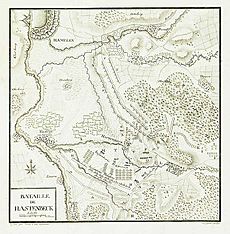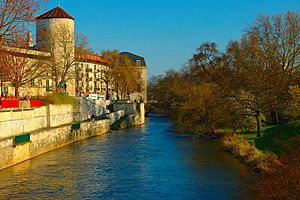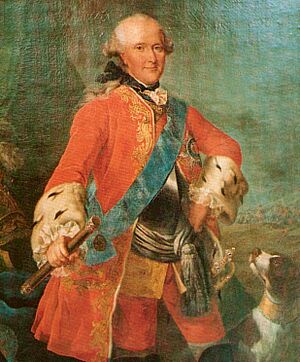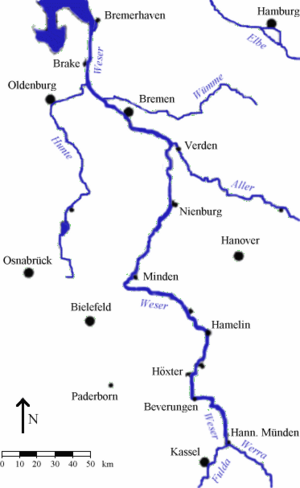Invasion of Hanover (1757) facts for kids
Quick facts for kids Invasion of Hanover |
|||||||
|---|---|---|---|---|---|---|---|
| Part of European theater of the Seven Years' War | |||||||
 Battle of Hastenbeck |
|||||||
|
|||||||
| Belligerents | |||||||
|
|||||||
| Commanders and leaders | |||||||
|
|||||||
| Strength | |||||||
| Roughly 100,000 | |||||||
The Invasion of Hanover happened in 1757 during the Seven Years' War. A large French army, led by Louis Charles César Le Tellier, duc d'Estrées, marched into Hanover and nearby German states. This happened after the Battle of Hastenbeck.
French forces quickly took control of most of Hanover. This forced the "Hanoverian Army of Observation," which was supposed to defend Hanover, to retreat to Stade on the North Sea coast. At the Convention of Klosterzeven, the Duke of Cumberland agreed to send his army home and accept the French takeover of Hanover.
However, the British king, George II of Great Britain, who was also the ruler of Hanover, later canceled this agreement. His British ministers pushed him to do so. The German troops then returned to fighting. By spring 1758, under a new leader named Ferdinand of Brunswick, the Allied forces had pushed the French out of Hanover. They even pushed them back across the River Rhine. Germany remained a key battleground for the rest of the war. Ferdinand successfully stopped further attacks on Hanover and its allies.
Contents
Why the Invasion Happened
After fighting started between Britain and France in North America in 1754, France realized it might lose its colony of French Canada. Canada had fewer people, soldiers, and resources than the British colonies. So, France decided to try and capture something valuable in Europe. They hoped to trade it for Canada if the war ended in talks.
Since 1714, Britain and Hanover had the same ruler. George II was king of Britain and also the Elector (ruler) of Hanover. France thought that by taking over Hanover, they could put pressure on him as the King of Great Britain.
Britain first planned to hire 50,000 Russian soldiers to protect Hanover. But they changed their plan. They made an alliance with Prussia instead. They also formed an "Army of Observation." This army was made up of soldiers from Hanover, Brunswick, and Hesse. The British government mostly paid for them. Famous British officers like Jeffrey Amherst and Guy Carleton were part of this force. The Duke of Cumberland, King George II's second son, was put in charge. The name "Army of Observation" meant they hoped the army would just watch and stop any attack.
In 1756, when France seemed ready to invade Britain, many Hanoverian and Hessian troops were sent to southern England. They helped boost Britain's defenses. Once the invasion threat passed, the troops went back to Germany.
Fighting in Western Germany also connected to a fight between Austria and Prussia. These two countries went to war in 1756. After the First Treaty of Versailles, Austria and France became allies. They planned to defeat the German allies one by one in 1757. First, a large French force would sweep through Western Germany. It would defeat and occupy Hanover. Then, the French would turn west to attack Prussia. Austria would attack Prussia from the south. France started building a large army called the Army of Westphalia, led by the Duc d'Estrées.
The Invasion Begins
In early June 1757, the French army started moving toward Hanover. It was clear that no peace agreement would be reached. The first small fight between the two armies happened on May 3. Part of the French army was held up by the siege of Geldern. It took three months to capture this town from its 800 Prussian defenders.
The main French army slowly moved across the Rhine River. It was hard to move such a large army, estimated at about 100,000 soldiers. The smaller German Army of Observation retreated across the River Weser into Hanover. Cumberland tried to get his troops ready. On July 2, the Prussian port of Emden fell to the French. A British navy squadron sent to help couldn't get there in time. This cut off Hanover from the Dutch Republic. Now, supplies from Britain could only come directly by sea. The French then took Cassel, securing their right side.
Battle of Hastenbeck
By late July, Cumberland thought his army was ready to fight. He set up his defenses near the village of Hastenbeck. The French won a close victory there. As Cumberland's army retreated, it started to fall apart because morale was very low.
Even though he won, d'Estrées was soon replaced as the French army commander. The Duc de Richelieu took over. Richelieu had recently done well leading French forces that captured Minorca. Richelieu's orders were to take full control of Hanover. Then, he was to turn west and help the Austrians attack Prussia.
Hanover is Occupied
Cumberland's forces kept moving north. The French chase was slowed down by more supply problems. But they steadily followed the retreating Army of Observation. To create a distraction and help Cumberland, the British planned a raid on the French coastal town of Rochefort. They hoped this threat would make the French pull troops from Germany to protect their coast.
Under Richelieu, the French continued their push. They took Minden and then captured the city of Hanover on August 11.

Richelieu sent a force to occupy Brunswick. Frederick the Great then decided to pull the Prussian soldiers from Cumberland's army. They rejoined Frederick's own forces, making the Army of Observation even weaker.
The Hanoverian government retreated with Cumberland through Verden to Stade. Stade was the capital of Bremen-Verden and a port city connected to the North Sea by the River Elbe. Stade was well-fortified and could get supplies from the sea. But Cumberland still felt their situation was risky. The idea of sending many British reinforcements to Stade was rejected. The British expedition went to its original target, Rochefort. However, it was launched too late to help Cumberland.
Orders were sent to Captain Hyde Parker. He was to use his Royal Navy ships to keep the supply route open down the Elbe to Cumberland. This was until ice made it impossible. The presence of this navy squadron made Richelieu believe that Cumberland's position in Stade was safe. He couldn't be defeated by a lack of food or supplies. Morale in the French army had now dropped. Many troops were sick. Richelieu was now open to talking about peace. He had rejected this idea on August 21 when Cumberland suggested a ceasefire.
The Klosterzeven Agreement
Frederick V, the King of Denmark, had promised to send troops to defend the Duchies of Bremen and Verden. These areas were ruled by the same king as Britain and Hanover. He had to send troops if they were threatened by a foreign power. He wanted his country to stay neutral. So, he tried to arrange an agreement between the two commanders.
Richelieu didn't think his army was in good enough shape to attack Klosterzeven. He was open to the idea. Cumberland also wasn't hopeful about his own chances. On September 10, at Klosterzeven, the British and French signed the Convention of Klosterzeven. This agreement immediately stopped the fighting.
The terms of the agreement included several points. Soldiers from Brunswick and Hesse would go back home. Half of the Hanoverian army would stay at Stade. The rest would move across the River Elbe. Most of Hanover would be under French control, except for a neutral zone. The French would leave the Duchy of Bremen. This was if the British removed their ships from the River Weser. However, some parts of the agreement were unclear. This led to later arguments. After the agreement, the Army of Observation started to break up. They were not asked to give up their weapons. But some Hessian soldiers were forced to give up their weapons by French troops. This seemed to break the agreement.
The agreement was immediately criticized in Britain. George II had given Cumberland permission to negotiate. But he angrily scolded his son when he returned to London in October. Cumberland was forced to resign from all his military jobs. Richelieu also faced strong criticism from Paris. The terms were seen as too easy on the enemy. He decided it was too late in the year to attack Prussia fully. That would have to wait until the next year. Instead, he moved his forces to stay for the winter around Halberstadt. This was even though he had orders to attack the Prussian fortress of Magdeburg.
The British government said they were not bound by the Klosterzeven agreement. They said it went against their own agreement with Prussia. They also started to convince George II and his Hanoverian ministers to abandon the agreement and rejoin the war. On October 8, George II canceled the agreement. He used a small detail about the French interfering with Hessian forces going home. Since the French were also unhappy with the agreement, they were ready to start fighting again.
The British told the Hanoverians to reform the Army of Observation. They chose Ferdinand of Brunswick, a Prussian commander and brother-in-law of Frederick the Great, as its new leader. The British now agreed to pay for the Hanoverian troops and other groups. This was a big change for William Pitt. He had been against Britain spending more money on a war in Europe. However, he still insisted that no British troops would join Brunswick's army. But this later changed, as British troops did reinforce the Allied army in later battles, like Wilhelmstahl.
Allied Counter-Attack

Ferdinand immediately started to improve the forces under his command. He tried to give the Hanoverians a new fighting spirit. He was helped by the fact that the French troops had been very cruel. This turned the local people against the occupiers.
After Frederick the Great won a victory over the French at Rossbach, Ferdinand launched a winter campaign. This was unusual for the time. The French forces were in bad shape by this point. Richelieu started to retreat rather than face a big battle. Soon after, he resigned. Louis, Count of Clermont replaced him. Clermont wrote to Louis XV describing how bad his army was. He said it was full of thieves and sick soldiers. Richelieu was accused of many wrongdoings, including stealing his own soldiers' pay.
Ferdinand's counter-attack led the Allied forces to recapture the port of Emden. They pushed the French back across the River Rhine. By spring, Hanover had been freed. In late 1757, the French seemed close to winning the war in Europe. But early 1758 showed a change. Britain and its allies started to have more success around the world.
What Happened Next
Even with the setback in 1758, recapturing Hanover was still a key part of French plans. They wanted to use it to bargain for French lands they had lost. This became especially true after the fall of Quebec in 1759.
France sent more and more soldiers to try and defeat Ferdinand's army and take Hanover again. But despite many tries, they couldn't break through and capture it. After the last French attempt was defeated at the Battle of Wilhelmsthal in 1762, a ceasefire was agreed. The later Treaty of Paris forced France to remove all its forces from Germany and the Austrian Netherlands.
In the later American War of Independence, France signed an agreement with Hanover to stay neutral. This meant France would not attack Hanoverian land. This showed that the French leaders realized it had been a mistake to attack Hanover in 1757. They had put so many troops and resources into trying to retake it. Meanwhile, British forces were free to attack French colonies in the West Indies, Canada, Africa, and India.
 | James Van Der Zee |
 | Alma Thomas |
 | Ellis Wilson |
 | Margaret Taylor-Burroughs |


